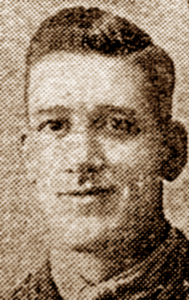Digest of stories from The Luton News: Thursday, October 31st, 1918.
On Sunday afternoon an interesting ceremony took place at Luton Town Hall when the Lord Lieutenant of Bedfordshire (Mr S. H. Whitbread), by command of the King, presented three medals of the Order of the British Empire. The recipients were employees of Messrs G. Kent Ltd who had been awarded the honour for great courage at a mishap which occurred last March. [The report did not mention that the 'mishap' was an explosion and fire at the Chaul End works on March 7th, as a result of which four munition girls died.]
There was a large attendance, chiefly representing the works, in the Council Chamber at 3.30pm. The Mayor (Councillor Charles Dillingham) welcomed the visitors on the first occasion of this kid in Luton, and said he was proud of the three districts which each had the honour of claiming a recipient of the medal, men who had the right to be called brave.
The Town Clerk (Mr William Smith) first called on Mr Samuel Beddall, of Harris Villa, Chiltern Road, Dunstable. At great personal risk he twice entered a burning room and rescued three workers, in spite of dense fumes and personal injuries. He was loudly applauded as the medal was pinned on his coat.
Mr Herbert Thomas Honnor, of 58 Naseby Road, Luton, was the next recipient. He received the medal for courage and high example in rescuing, at great personal risk, two fellow workers, and was likewise congratulated.
The third medallist was Mr Alexander McKay Pattison, of 65 Dordans Road, Leagrave, who received the honour also for courage and high example during the fire. Though suffering from burns, he rendered important assistance to several women who were in great danger. Mr Pattison received an extra round of applause.
-
 To be awarded the Military Cross for gallantry in the field yet to be killed in action before he received his decoration was the regretted fate of Sec Lieut F. C. L. Harrup (Royal Fusiliers). Deceased, who was formerly in the employ of Mr H. Inwood, Chapel Street, was unmarried and the eldest son of Mr and Mrs Harrup, of Tilsworth. Sec Lieut Harrup is pictured, right.
To be awarded the Military Cross for gallantry in the field yet to be killed in action before he received his decoration was the regretted fate of Sec Lieut F. C. L. Harrup (Royal Fusiliers). Deceased, who was formerly in the employ of Mr H. Inwood, Chapel Street, was unmarried and the eldest son of Mr and Mrs Harrup, of Tilsworth. Sec Lieut Harrup is pictured, right. -
There cane be no doubt that the influenza epidemic is now at its height in this district. The most serious feature has been the occurrence of some 20 or 30 deaths. Mr T. Neville, the undertaker, informs us that he and his men have been working day and night, and the undertakers of the town are at a loss to know how to thoroughly cope with the unprecedented situation. This will be understood by the fact that one undertaker alone had 11 funerals at the General Cemetery on one day.
-
Cpl J. Smart (Rifle Brigade), of Wenlock Street, Luton, who was taken prisoner by the Germans in August 1914 is now an inmate of Wardown V.A.D. Hospital, having fallen victim to the influenza epidemic. He was repatriated to Holland a short time ago and was spending a period of leave at his home when attacked by the illness on Saturday.
-
In his report ot the Luton Rural District Council at a meeting on Monday, Medical Officer Dr Rollings said there had been a very serious outbreak of influenza at Leagrave, and it was now existent at Sundon and Barton. In the Leagrave district he believed it had spread owing to overcrowding due to the importation of a large number of workpeople for whom no proper provision had been made.
-
Lieut H. C. Lintern, formerly a teacher at Surrey Street Boys' School, Luton, has been promoted to First Lieut and been awarded the Military Medal.
-
Fifty wounded soldiers were entertained on Saturday at the Diamond Institute by the Davis Girls Social Club. The men, who came from the M.F.S. Hospital at Wheathampstead, were met at the station and conveyed to the Institute in Dallow Road in motors. To each Tommy a girl was allotted whose duty it was to entertain him all the evening.
-
The Herts County Museum, St Albans, has received an interesting gift from Mr Harry Smart, of Selbourne Road, Luton, in the form of an old candlestick of turned wood which was discovered beneath the floor of an old house in the city.
-
Sgt W. C. Thirkettle, a Broadstairs man who for over a year was stationed at Stockwood with the Army Service Corps (M.T.), writes that his platoon was one of the first to enter Lille in France after its evacuation by the enemy. The English, he says, were wildly acclaimed by the inhabitants, who had been hiding in cellars, and there was hardly a man among the victorious troops but was visibly affected at the joy and relief experienced by the unfortunate residents. Sgt Thirkettle was transferred from the A.S.C., which he joined the day after war was declared, to a Kentish infantry regiment. He lost his rank of corporal when he went into a line, but has quickly gained three chevrons.

